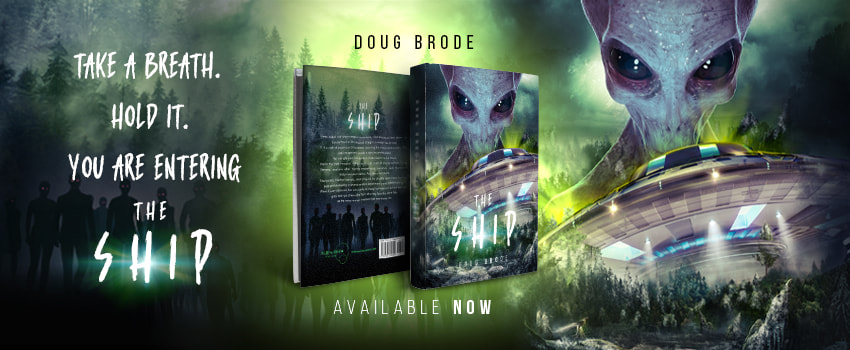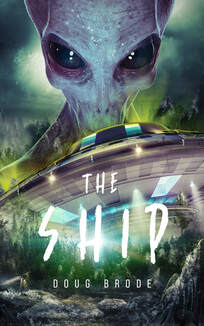 This month we have a real treat, a bonus interview with storyboard artist turned author Doug Brode. As you'll see below, Doug has worked on a number of high-profile projects over the years, sketching shots alongside top directors like JJ Abrams, Rian Johnson, Jon Favreau, and others. I happened to meet Doug by chance online, and I wound up having the opportunity to edit his new sci-fi novel, The Ship. My personal involvement aside, I thought it was a fantastic read that is sure to appeal to fans of Stephen King, Michael Crichton, Andy Weir, and similar authors. You have quite an impressive resume as a storyboard artist, prop artist, and concept artist. How did you get into that line of work? I was originally going to be a comic book artist until I saw Bram Stoker’s Dracula. I was about 19 or 20, and the art design really clicked something in my mind that film might be a more interesting career choice for me. I didn’t really see myself drawing men in tights forever, and film was something which I’d always loved. I moved to LA, got a job as a runner for Joel Silver’s production company, until someone there noticed my art. My first film was House on Haunted Hill around ’98, I think. What role does a storyboard artist play in the filmmaking process? I help the director design all the shots, usually for special effects and stunts through the film. Basically, I create a “comic” for the crew so that everyone knows what the shots or effects will look like, long before they shoot them. How closely do you work with the director? Very close. I’m there to work with them one on one to clarify their vision so that they can present a clear, shot-for-shot vision to the crew. On most films we usually meet three times a week, and most meetings go about 1.5 hrs. What are some of the favorite film projects you've worked on? JJ Abrams' Star Trek reboot. Iron Man. Thor. Looper. Planet of the Apes. MIB: International. There’s been a lot, but those all hold very fond memories. And of course, my own series, Forbidden Science, for which I was creator and head writer. That was the best creative experience I’ve ever had. The show had more "T and A" than I’d originally envisioned, but it was an incredible experience seeing my own ideas being filmed and then shown on Cinemax each week. It’s now on Amazon Prime. I’ve been surprised how long of a life one little sexy sci-fi series can have. Even though it only ran one season, it’s been watched all over the world and is still going. What prompted you to transition into writing? I always had an interest in storytelling. Sequential art, like comics and storyboards, are storytelling, but they’re someone else’s story usually. With writing it’s 100% your vision, your voice. I left screenwriting because even if someone buys or options your script, it doesn’t mean it will get made. Most of the time it won’t. And I got tired of having a pile of scripts lying around. With a novel, it’s out there for the world to read – which is why I wrote my debut novel, The Ship. I’d had the idea and the twist ending for over ten years. I was saving it for when I was ready to finally write a book. Tell us about The Ship. What's the premise of the novel? A young woman awakens within a crashed alien vessel 35 years after being abducted. Basically, I took some of the tropes from the 80’s and 90’s sci-fi horror films and shows and gave them a modern scientific facelift. I loved the X-Files back in the day, along with The Thing and Aliens, and wanted a book with that kind of mystery and excitement. Do you plan to continue the story in subsequent books? While The Ship is a stand alone novel, I do have a plan for two sequels. What attracts you to the sci-fi genre? Concepts and ideas. I like to play around with some of the old sci-fi tropes I grew up with and give them a modern twist for the 21st century. Today’s sci-fi often seems to be taking real world situations and turn them into a futuristic story. I have no interest in that. Give me big ideas; big concepts and an exciting story with a fast pace, and I’m hooked. That’s what I did with The Ship, so hopefully others are looking for that kind of sci-fi as well. How does your background in film affect your writing process? Film and TV taught me to write with a tight structure and keep things contained in both the POV (point of view) and scope, so that the focus is always on the characters. The closer you stick to the characters, the more tense and thrilling the story will be. What book or film projects are you working on right now? I’m working on the sequel to The Ship now. What do you do for fun outside of work? I collect video games and vinyl records. Call of Duty with a Prince record playing is my nirvana.
3 Comments
4/28/2022 07:29:12
But it was an incredible experience seeing my own ideas being filmed and then shown on Cinemax each week. Thank you for the beautiful post!
Reply
5/6/2022 11:36:19
Give me big ideas; big concepts and an exciting story with a fast pace, I truly appreciate your great post!
Reply
7/15/2024 14:55:13
I left screenwriting because even if someone buys or options your script, it doesn’t mean it will get made. Most of the time it won’t. And I got tired of having a pile of scripts lying around. Thank you for making this such an awesome post!
Reply
Leave a Reply. |
Kevin MillerBrief thoughts and updates on writing, publishing, and life Archives
June 2024
Categories
All
|
 RSS Feed
RSS Feed

